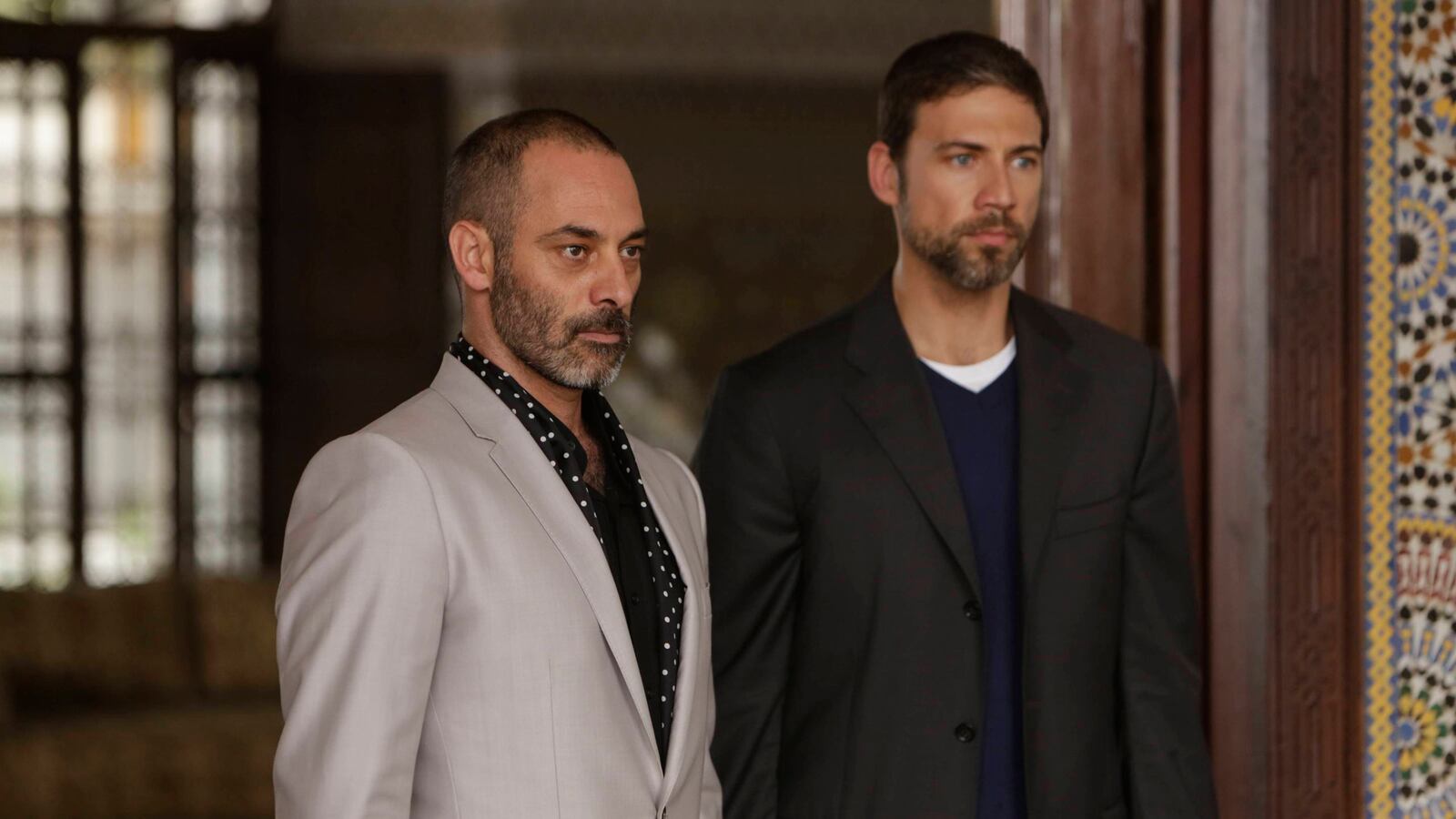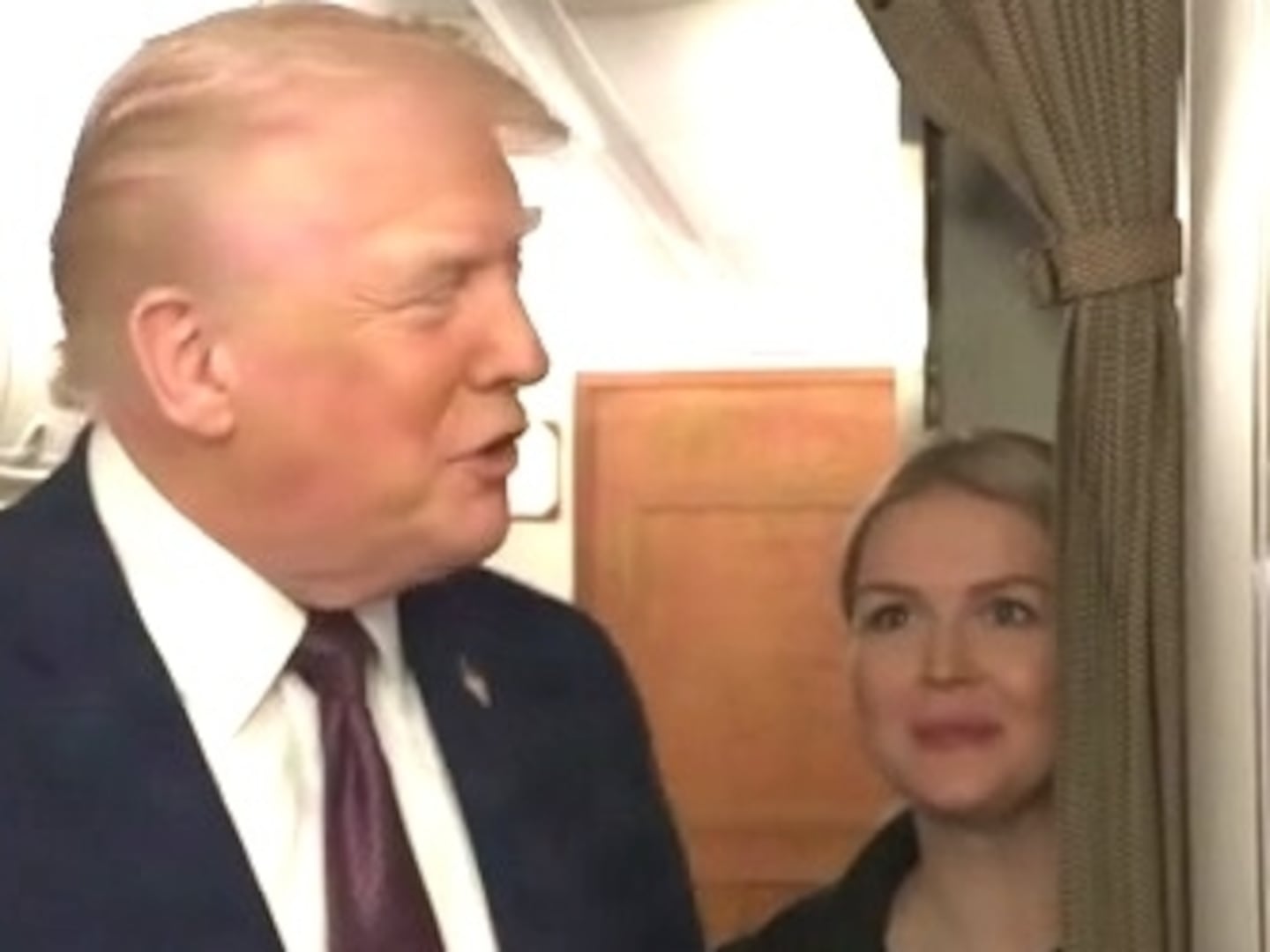There's a moment in the first episode of Tyrant that made me laugh out loud, which isn't a good thing, because Tyrant—FX's new hour-long drama about the fictional ruling family of a fictional Middle Eastern nation—may be trying harder than any show I've ever seen to be Serious with a capital S.

Our hero, Bassam "Barry" al-Fayeed, is a Pasadena pediatrician who has reluctantly returned to his homeland of Abbudin (after a self-imposed 20-year exile) to attend his nephew's wedding. Apparently, terrorists are plotting to disrupt the nuptials, so Bassam's father, Abbudin's controversial dictator, has dispatched Bassam's brother, the hotheaded Jamal, to "deal with" a lackey who is paid by the regime to keep his resistance-leader nephew under control. A buck-naked Jamal—don't ask—is dealing with the lackey by beating him in a bathroom. Bassam steps in.
"Jamal, stop it!" Bassam shouts, just as Jamal slices into the screaming lackey's fingers with a straight razor. "You're giving him more reason to attack than he already has!"
"You don't understand," Jamal fires back, struggling to catch his breath. "You've been gone too long. This asshole and his nephew need to learn there are consequences."
"OK," Bassam replies. "But not like this."
"Then how!" Jamal cries. Bassam has pinned him to the wall. "Tell me! I'm listening!"
Bassam looks back at the bloody lackey. "Talk to them," Bassam explains. "Invite them to the wedding... Invite their whole family. Put one of them at every single table. He'll find a way to make sure no one attacks."
Jamal is stunned by Bassam's genius. He paces the room, pausing for a few pregnant seconds to fully absorb his brother's brilliant plan. He staggers over to the sobbing lackey. And he invites him and his family to the wedding.
As I said, LOL.
On Tyrant, which premiered Tuesday night, this is what passes for political drama. But in reality, it's nothing of the sort. A good political drama is specific: even though we know the characters and conundrums aren't real, it feels like they could be—and that's the fun of watching. Going behind the scenes. Behind the headlines. Seeing how things might actually work in the upper echelons of power.
But Tyrant provides few of these vicarious thrills. Why? Because it's too cautious to dramatize real problems and too reductive to tackle them realistically. Instead it invents a generic "Middle Eastern" country with generic "Middle Eastern" issues—and repeatedly suggests that we could solve those issues if we just, you know, invited the terrorists to the wedding. It's the geopolitical equivalent of mansplaining—Amerisplaining, anyone?—and it doesn't just make for some simple-minded television. It makes for some pretty boring television, too.
How did this happen? When I first heard about Tyrant, I thought it had the most promising premise of the season: a Godfather of sorts, but set in the Middle East—the only milieu murkier and more intriguing than the mafia. Toss in some family turmoil (when Bassam's father dies, his wife and children stay with him in Abbudin so he can advise his brother) and some fish-out-of-water tension (the American al-Fayeeds are alternately aghast and beguiled by their relatives' opulence and brutality), and you have a fairly straightforward recipe for success: a series that's as personal as it is political, with an endless supply of knotty, nuanced, inspired-by-true-events material to work with.
But after watching the show's first four episodes, I can't help but think that the showrunners' pesky agenda has compromised what could have been a groundbreaking drama.
For starters, the family side of Tyrant is painfully superficial. Bassam's American children are barely characters at all; instead they're props designed to serve as the viewer's avatars in a strange, autocratic land, and almost every line they deliver is some variation on "this palace is totally awesome" (Sammy) or "our grandfather was a war criminal" (Emma). Bassam's wife Molly makes even less sense; she's oddly eager to move to a dangerous, despotic country (even though she has a medical practice back in California, too) and she's constantly asking her reserved husband why he's estranged from his family (as if the whole war-crimes thing wasn't enough).
Meanwhile, the fraternal relationship between Bassam and Jamal—such a rich source of drama in The Godfather—basically consists of Jamal growling "We're brothers" four or five times per episode. No real rivalry, envy, betrayal, or even affection, at least not yet. The actor who plays Bassam—bearded, blue-eyed Englishman Adam Rayner—does what he can with the material, but it's not much. Basically he walks around looking stricken, with none of the brooding ambivalence of a Michael Corleone or volcanic pain of a Tony Soprano.
As pro forma as the personal stuff is, Tyrant still could've been a compelling show—if it got the political stuff right. It doesn't. The problem, I think, is twofold. Tyrant showrunner Howard Gordon is the 24 alumnus who co-created Homeland with Israeli television writer Gideon Raff; Raff is also his co-creator here. Both 24 and Homeland caught significant flack from critics for stereotyping Muslims and Middle Easterners.
I suspect the experience made both Gordon and Raff a bit gun shy about the subject—hence the decision to set the series in Abbudin and not Egypt or Iraq. This would have been fine if they had rendered Abbudin with the complexity and granularity of a real Middle Eastern country—or even, say, Game of Thrones's Westeros. The rival political factions in Cairo. The warring ethnic groups in Baghdad. The intra-palace jockeying outside Riyadh. But everything in Abbudin feels willfully generic, as if even the tiniest hint of specificity might give offense. All of the characters—the bellicose general, the self-righteous terrorist leader, the conniving first lady—seem like they're striving to be clichés. There's no substance to any of them—nothing to hold onto or care about. It makes watching a slog.
And that isn't even the biggest political problem with Tyrant. The show's biggest problem is the tendency I referred to earlier: its tendency to Amerisplain the Middle East. When Jamal wants to hang the terrorist leader on trumped up charges, he argues that "if he's not guilty of this, he's guilty of something else." But Bassam has a lesson to teach him.
"That's not how it works!" he shouts. "This is the 21st century, OK? The whole world is watching and you're going to get caught. When people find out that you killed this rock-star rebel leader for a crime he didn't commit, you'll be staring at a full-blown revolution."
Again Jamal is bowled over by his brother's Westernized wisdom. Again he asks for Bassam's advice. "Just tell me what to do and I will do it," he says. "Open the jails and set everyone free?"
"Yeah, yeah," says Bassam. "We could start with that, sure."
And again Jamal does what his brother suggests. The same thing happens in pretty much every episode. When teenage terrorists take Jamal's new daughter-in-law hostage, Bassam rushes to the scene.
"Have you offered them anything," he asks his uncle, the general.
"Yes," the general says. "20 minutes before I kill them all."
"Let me go in there and talk to them," Bassam says.
"Go back to the palace, my son," the general snaps. "Better yet, go home."
"I'm going in there," Bassam replies. Thirty seconds later he walks out with his niece. The terrorists, of course, have surrendered.
And so on. When Arab Spring-style protests take shape in the capital's main plaza, Jamal orders up a "bloodbath." Bassam urges him to reconsider.
"The world won't look the other way anymore," Bassam insists. "Even if [the general] clears the square today, twice as many people will come back tomorrow, and they'll keep coming back 'til they're outside the palace."
Jamal paces back and forth. He looks agitated.
"I'm not saying 'Don't use violence because it's wrong,'" Bassam continues. "I'm saying, 'Don't use violence because it doesn't work.'"
"Tell me what will work," Jamal says—for what feels like the 27th time.
At which point Bassam informs Jamal the rebel leader is willing to (you guessed it) talk. "Let me go and see him and find out what he wants," Bassam Amerispains. "Maybe it's things we can agree to, like a constitution or a more transparent economy. Things that maybe aren't worth massacring people over." He pauses, meaningfully. "You can go down in history as one more brutal dictator," he finally says. "Or you can be remembered as the leader who had the courage to listen to his people. Who do you want to be?"
We get it. If Middle Eastern dictators simply acted more like American presidents, the world would be a better place. Sure, it wouldn't be easy; even Bassam suffers some setbacks on his quest to single-handedly liberalize Abbudin. (The general kills the teenage terrorists; the rebel leader continues to stir the pot even after he's set free.) But the message is clear: America knows best.
Perhaps Gordon and Raff are right about this. I mean, who am I to weigh in on Middle Eastern politics? But here's what I can weigh in on: the case they make on Tyrant isn't particularly convincing, or even all that entertaining. The details are too generic. The conflicts are too simplistic. Abbudin is too unreal.
It's a shame, because politics—its peril and its promise—is one of the richest subjects in all of drama. Take Borgen, a show about the most boring subject imaginable—Danish parliamentary maneuvering—that manages to be absolutely riveting because it treats that maneuvering with the respect it deserves, delving deeply into the compromises, both personal and professional, that politicians, journalists, and operatives must make every day to do their jobs. Seeing how the sausage is made is always interesting—even if the sausage isn't particularly spicy. And when it is spicy? Then there’s no excuse for being bland.




